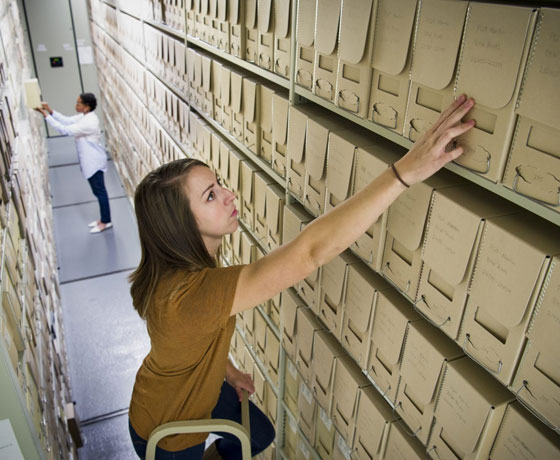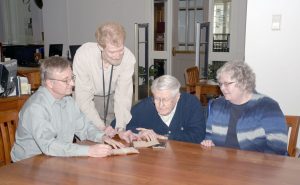
Purchase Tickets
Thinking About a Donation to IHS? These Guidelines Will Help
June 3, 2020

Many have been taking greater advantage of opportunities recently presented at home to sift through cupboards, closets, attic storage spaces and other nooks and crannies to uncover what is there. Assessing memorabilia and the cumulative legacies of material boxed up, stuffed into corners and drawers, or placed on shelves for safekeeping is not a simple endeavor.
Ultimately, the question boils down to how to manage the “stuff” of a lifetime, and some of this activity may have been fast-forwarded during stay-at-home downtime.
Whether rooted in a preoccupied pandemic-frenzied housecleaning or in ongoing downsizing efforts, there are limited opportunities for heaving items, repurposing others, or exploring options to donate them thoughtfully. And it helps to have the proper contacts for helping make some of these determinations.
My position is chiefly responsible as a contact for ongoing assessment and consideration of prospective acquisitions and donations to the Archives and Library of the Indiana Historical Society.
What IHS collects: the paper, visual, recorded, printed and published historical record of Indiana – the territory, the state and the region. More recently, the organization’s collection development has grown into born-digital media, which has brought the acquisition of history into the moment and more immediate. The Society’s new COVID-19 collecting initiative is one of the most outstanding examples.

The IHS staff secures the order of processed collections in the IHS library stacks.
So, you would like to propose a donation to the IHS? Guidelines can be helpful, and there may be a few questions or reflections to consider before preparing to make a proposal:
- Is the material Indiana-related with roots within/ties to the state or pertinent to an Indiana or regional story?
- What is the condition of the material? Is it intact and whole with anticipated levels of wear and use over time, or is it torn, dirty, mold-invested, or ravaged in other ways? Description is always helpful. Some paper items may require mending or conservation by our professional staff. To what extent work may be needed impacts staff and workflow, so this is often a consideration for us.
- Have you consulted the Indiana Historical Society’s online catalog? To avoid duplication, a quick check may help in determining whether or not we have a certain item or publication already. You may access the catalog for your search here:
- If you have books that were produced by the Indiana Historical Society, chances are that we have these already. IHS has consistently maintained at least two or three copies of each major publication or serial it has produced via the IHS Press or other means. There may be options for you to investigate for placing these duplicate copies with another repository or resale agency.
- Will you be able to describe in full detail what you have, provide a detailed inventory of larger bodies of material or publications, or share images via email that will help us with the assessment process?
- Three-dimensional objects and artifacts are generally not collected or accepted by IHS in isolation apart from possible connection to an archival collection. We begin most offers of artifacts with a referral to the Indiana State Museum first, as it is the primary object repository in the area. There could be county museums or libraries, either in Indiana or in other states, that could provide the best home for some treasures you may have.
During the COVID-19 pandemic, procedures and how we manage the donation process have been adjusted significantly, so we want people to know and to understand some of these limitations.
- Modified hours of operation and availability may limit the quantity and types of donations we can consider.
- Off-site visits to homes or businesses present challenges and would need to be considered and established well in advance. How these opportunities and needs will be addressed precisely is still being explored.
- Meetings with donors at IHS will be possible on an appointment-only basis, scheduled well in advance. Walk-ins are discouraged and donors are urged to schedule a mutually-agreeable future time to discuss a donation proposal.
- Material sent through the mail should be approved in advance and IHS notified whenever possible. Anything sent without prior notice and approval may not be retained and could be returned to the donor.
- For safety, mail received will be quarantined for a set period of time and opened after that period expires, after which the material will be examined and the registration and receipt process undertaken.
- Material received and accepted will follow with a letter of acknowledgment and deed of gift sent to the donor to sign and return to IHS.

Donor meeting at IHS with members of the Cotterman family to receive the family’s farm journals.
If it turns out the items or material being offered are not needed by IHS, we may be able to provide referrals, whenever possible, that can be helpful. As we are bound by ethi
cal practices of the profession, staff cannot provide appraisals to the public as a general practice or for materials donated, but we maintain a list of professionals on the IHS website that may be helpful with these pursuits.
Good luck with your materials management undertakings,. Please contact me via email at emundell@indianahistory.org if you have any questions. We welcome the dialogue. Be safe!









